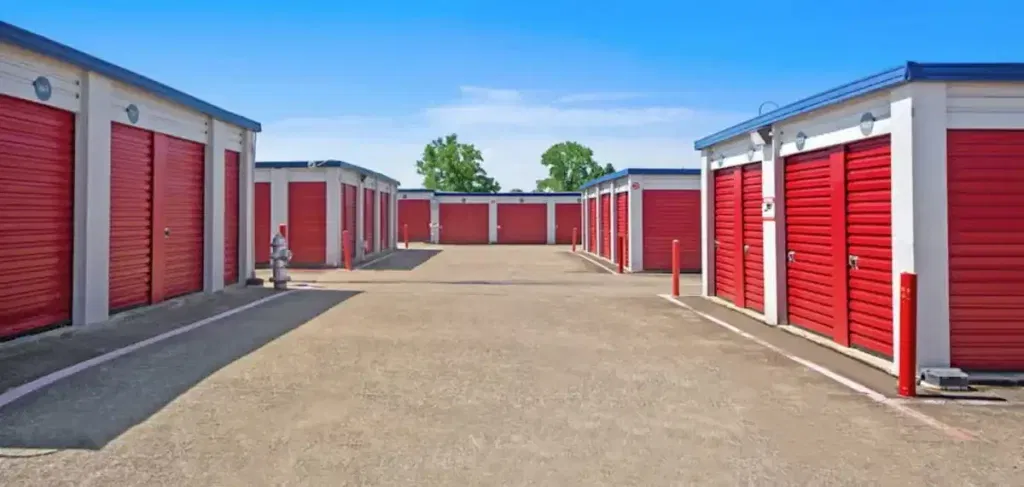If you intend to run a storage unit, then be prepared for careful planning, evaluation, and making important decisions. That includes getting to know the pros and cons of owning storage units – of course, like any business, these factor in your business setup.
Generally, you want to know what the business entails – like any business though. This typically includes the unique opportunities and potential rewards it brings, as well as the risks that come along the way, especially as your business expands.
This blog post has you covered – our real estate experts have carefully identified common upsides and downsides to know before venturing into storage units.
- Storage units are consistently needed, making them a stable business.
- The industry provides a reliable income source despite economic changes.
- Minimal staffing is required due to the self-service model.
- Investment in top-notch security measures is crucial.
- Keeping up with market trends is necessary due to industry growth.
- The business demands hard work and commitment for success.
Pros and Cons of Owning Storage Units

Since this article looks at the storage unit business from two angles, we have divided the major sections into two – one for the pros and the other for the cons.
Irrespective of the cons you will find here, do note that there are ways to resolve them. It is just up to how you plan to run the business, as well as your environment and the people you lease to.
Let’s cut short the stories and get into the pros and cons of owning storage units.
Pros of Owning Storage Units
1. A Safe Storage Space
The main advantage of running a storage facility is providing a secure place for people to keep their stuff. This can be particularly helpful for businesses that have assets not needed year-round.
Your customers could be individuals or families who need to clear up some space at home, or they might be in the process of moving houses. Either way, offering a secure and accessible storage unit is a great help to your community.
Apart from catering to renters, your storage facility also serves local businesses. Companies often require additional space to store their supplies, unused items, or important documents outside their premises. Your storage unit can provide the extra space these businesses need for item storage.
These items can range from vital documents, intellectual property to even larger physical assets like furniture or machinery. A landscaping firm, for instance, may opt to stow their lawnmowers in your facility, while a downsized small business might store additional desks there.
2. It Doesn’t Require Heavy Involvement
Often, storage units are a self-service model. Customers will come to you to sign a rental contract and pay their fees, and that’s the last you’ll likely see of them if everything goes smoothly. This leaves you free to focus on site management, billing, and maintaining the security of the stored properties.
Storage facilities also operate with minimal staffing, sometimes with just a shift manager at a time. Some even close overnight, and then have automated security systems do the work, which lowers labor costs. This transitions into another importance of storage unit – security.
Home and office break-ins can happen, but a secure storage unit can minimize this risk. Proper security measures and even insurance coverage at your facility can give your customers that much-needed peace of mind.
3. High and Stable Demand
The need for storage units is typically high and relatively stable. People are buying more stuff due to the convenience of online shopping, leading to the accumulation of more items that need storage.
Moreover, life changes such as moving or downsizing due to economic situations also contribute to the demand. Regardless of the economic conditions, people will continue to need storage units – it is typically affordable.
4. Financial Stability
Despite economic fluctuations, the self-storage industry is seen as a reliable source of income for the foreseeable future. This is due to the continuous demand for storage space, both from individuals and businesses alike.
That is to say that storage units are generally affordable. Most families can comfortably afford the monthly rental price of a storage unit.
The cost may range from $12 to $50 per unit each month, influenced by factors such as the location of the unit, the rental duration, and any additional features you opt for. Usually, full-service storage units cost more than self-service ones.
5. Insurance is Included in the Cost
Typically, storage unit companies require insurance to rent a storage unit – Move.org. However, rare exceptions may apply, for instance, insurance requirements depend on the specific unit you rent. But in most cases, insurance is required to rent a unit.
Renters and homeowners insurance policies offer either $1,000 or 10% of the overall limit for items stored off-site, depending on which sum is larger. So, there is protection for all parties involved, especially for those storing expensive items or who do not have an insurance policy.
6. Running Multiple Businesses from a Storage Facility is Possible
Many storage unit businesses in the US are affiliated with U-Haul or Public Storage and provide services like moving trucks or van rentals. This helps to move stuff at your convenience, as well as encourages renting a storage unit for your important items.
Depending on the facility’s zoning, you could also operate a fuel station, a cleaning service, or other contract work to increase your income sources.
7. Storage Units Provide Convenience
Storage units are a convenient solution for families juggling various time-sensitive obligations. They come in handy whether you’re assisting a college student moving out for the first time, or a family moving into their first house. Having a local storage unit to keep their items safe and accessible until needed can make these processes much easier for everyone involved.
8. Your Role in the Business Can Vary
A self-storage business offers you great flexibility in terms of your involvement. Depending on your preference, you can directly run the facility, hire a manager to oversee things, or even contract a management company to handle the operations and staffing. However, you will need the right management system in place for the freedom to spend time on other ventures.
9. A Self-Storage Business is Not Labor Intensive
Compared to many other businesses, a self-storage facility can be maintained with minimal staff. This is because customers often handle most of their needs independently, only requiring interaction with the management during signing contracts, paying rent, or moving out.
As a bonus, using a sophisticated security system can further reduce labor costs by eliminating the need for extensive security personnel.
10. Additional Profit Opportunities
Aside from storage rental fees, another pro is the several other ways to increase your revenue through a self-storage business. This could be through selling moving supplies or renting out moving trucks, which are services often required by your customers. Providing a tenant protection plan is another attractive revenue source to consider.
Cons of Owning Storage Units
Having looked at the pros, let’s consider the cons of owning storage units:
11. Putting Together a Stellar Team Takes Patience
In the storage unit business, the value of a great team can’t be overstated. That’s because these facilities are typically managed by small teams, and each team member carries significant responsibility.
The process of finding individuals who are not only competent but also a good fit for your team can be challenging and time-consuming. But remember, patience is key here.
Once you find those exceptional individuals, make sure to offer them adequate compensation and treat them well. Their contribution to your facility’s upkeep and success is invaluable.
12. Location Matters More Than You Think
Any business operating in a physical space understands the importance of a strategic location. This is no different for self-storage facilities. The right location is both highly visible and easily accessible.
If your facility is difficult to locate or hard to access, it could lead to lower occupancy rates. While this may be a more flexible aspect for those looking to construct a new facility, if you’re purchasing an existing one, you need to be innovative about ways to enhance its visibility.
13. Tenant Problems
When running storage units, you’re bound to come across some challenging tenants. This could be anything from tenants consistently delaying payments and then demanding their late fees be waived, to them actually living in their storage units, or even causing rodent problems because they store food items in their unit.
Some renters can attempt to illegally live in the units, even though it is highly illegal and unsafe to live in a storage unit – Apartment Therapy.
Such behaviors aren’t rare. As a self-storage business, you should be prepared to handle these issues professionally and systematically. This could mean coming up with efficient payment plans, organizing auctions, or establishing procedures to deal with late payments.
14. Security Concerns
In this business, securing your tenants’ belongings is part of the job. The more secure your facility, the more your customers will trust you with their items. Hence, investing in top-notch security measures like access control at the gate, security cameras around the premises, and individual unit locks is a must.
It’s not just about installing these security systems, though. You also need to ensure they are well-maintained and always functional.
Plus, as technology advances, newer and better security systems become available. Even if it’s costly, consider upgrading your old systems when you can afford them. This isn’t just about growing your business; it’s also about guaranteeing the safety of your customers’ items.
15. High Competition and Occupancy Rates
Experienced storage facility owners often aim for an occupancy rate close to 90%. However, this rate fluctuates and isn’t always guaranteed due to factors such as personal life changes of clients or increased competition.
As the storage industry expands, competition intensifies. However, you can stand out and maintain high occupancy rates by staying up-to-date with market trends and technological advancements. understand that demand drives the market, and adapt accordingly to stay ahead of your competition.
Occupancy rates can change. Target a high occupancy rate, say 90% or more, for your storage business. But remember, these rates can vary because life changes – people may move, face financial challenges, or other issues. If you’re looking for a business with guaranteed stability, the storage units business might not be your best choice.
16. Meeting Your City’s Requirements
The type of storage you provide should align with the requirements of the local community. Some people might prefer outdoor storage units that they can drive up to, while others might want indoor units. Conduct market research to help you understand what the city requires to help you meet the specifications.
17. It’s A Serious Commitment
Running storage units is a big responsibility. It demands hard work and commitment. If you’re not ready to handle tasks like regular maintenance, ensuring security, and dealing with other business matters, success might be challenging to achieve.
Conclusion on the Pros and Cons of Owning Storage Units
While owning a storage unit business does have its own pros and cons like any other venture, the benefits can outweigh the risks.
This business model could help your community since it provides a much-needed service, and at the same time, it could also boost your income. If you’re ready to manage the upfront costs of establishing this business and covering its operational expenses, a storage facility could become a consistent source of revenue for years to come.
Read also: How to Start a Group Home for Adults with Disabilities





